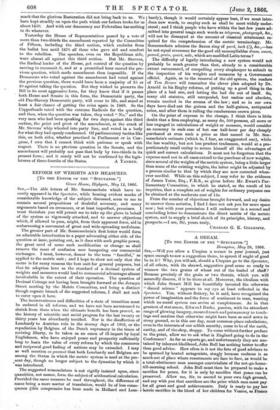REFORM OF WEIGHTS AND MEASURES.
[To THE EDITOR OF THE "SPECTATOR."]
Grove House, Highgate, May 12, 1866. Sia,—The able letters of Mr. Sonnenschein which have re- cently appeared in the Spectator, while bearing evident marks of considerable knowledge of the subject discussed, seem to me to contain several propositions of doubtful accuracy, and many arguments based on erroneous, or at least imperfect, pretnisses. I trust therefore you will permit me to take up the glove in behalf of the system so vigorously attacked, and to answer objections which, if allowed to pass, might, from their apparent force, aid in embarrassing a movement of great and wide-spreading usefulness.
The greater part of Mr. Sonnenschein's first letter would form an admirable introduction to a paper advocating either side of the question at issue, pointing out, as it does with such graphic power, the great need of some such modification or change as shall remove the mass of confusion now hampering our commercial exchanges. I must, however, demur to the term "fanciful," as applied to the metric unit ; and I hope to show not only that the metre is for many reasons the best unit for general purposes, but that its adoption here as the standard of a decimal system of weights and measures would lead to commercial advantages almost incalculable in the extent of their operation. The question of Decimal Coinage not having been brought forward at the Jermyn Street meeting by the Metric Committee, and being a distinct though cognate branch of the suggested reforms, I shall not seek to enter upon it here.
The inconveniences and difficulties of a state of transition must be endured in all reforms, and we have not been accustomed to shrink from them when the ultimate benefit has been proved, as the history of scientific and social progress for the last twenty or thirty years has abundantly testified. Nor is the disaffection of Lombardy to Austrian rule in the stormy days of 1803, or the repudiation by Belgium of the Dutch supremacy in the times of reviving liberty, to be taken as an omen of ill import by loyal Englishmen, who have enjoyed peace and prosperity sufficiently long to learn the value of every reform by which the commerce and reciprocal good feeling of nations may be extended. I may as well mention en passant that both Lombardy and Belgium are among the States in which the metric system is used at the pre- sent day, though no longer subject to the dynasties by which it was introduced.
The suggested nomenclature is not rigidly insisted upon, since quantities, not names, form the subject of arithmetical calculation. Provided the same measure be used throughout, the difference of name being a mere matter of translation, would be of less conse- quence (this compromise has been made in Holland and Loin-
hardy), though it would certainly appear best, if we must intro- duce new words, to employ such as shall be most widely under- stood ; and I think people who have within the last few years ad- mitted into general usage such words as telegram, photograph, &e., will not be dismayed at the amount of classical attainment re- quired for the comprehension of the metric terminology. Mr. Sonnenschein admixes the Saxon ring of yard, inch (1), &c.,—has he not equal reverence for the good old monosyllables dram, ounce, pound, grain, quart, mile, which are modified Latin terms?
The difficulty of legally introducing a new system would not probably be much greater than that, already to a considerable extent surmounted, of compelling every shopkeeper to submit to the inspection of his weights and measures by a Government official. Again, as to the removal of the old system, the readers of Tom Brown will remember the clever plan adopted by Dr. Arnold in his Rugby reforms, of putting up a good thing in the place of a bad one, and letting the bad die out of itself. So, many old statutes, still unrepealed, but useless and obsolete, remain uncited in the areana of the law ; and so in our own days have died out the guinea and the half-guinea, antiquated coins, and after them is rolling the cumbersome crown piece.
On the point of expense in the change, I think there is little doubt that a firm employing, as many do, 500 persons, all more or less engaged in calculations of weight or measure, would consider an economy in each case of but one half-hour per day cheaply purchased at even such a price as that named in Mr. Son- nenschein's estimate (which is, I fear, an exaggerated one), while the less wealthy, but not less prudent tradesman, would at a pro- portionately small outlay to secure himself all the advantages of quick and correct calculations. It must not be forgotten that the expense need not in all cases extend to the purchase of new weights, since several of the weights of the metric system, being a little larger than some of the existing weights, the latter might be adjusted by a process similar to that by which they are now corrected when- ever needful. While on this subject, I may refer to the evidence of James Yates, Esq., F.R.S., as given before Mr. Ewart's Par- liamentary Committee, in which he stated, as the result of his inquiries, that a complete set of weights for ordinary purposes can be obtained at the moderate cost of 14s.
From the number of objections brought forward, and my desire to answer them seriatim, I find I dare not ask you for more space now ; but with your permission I will endeavour in a second and concluding letter to demonstrate the direct merits of the metric system, and to supply a brief sketch of its principles, history, and prospects.—I am, Sir, yours truly,
CHARLES G. K. GILLESPIE.






























 Previous page
Previous page